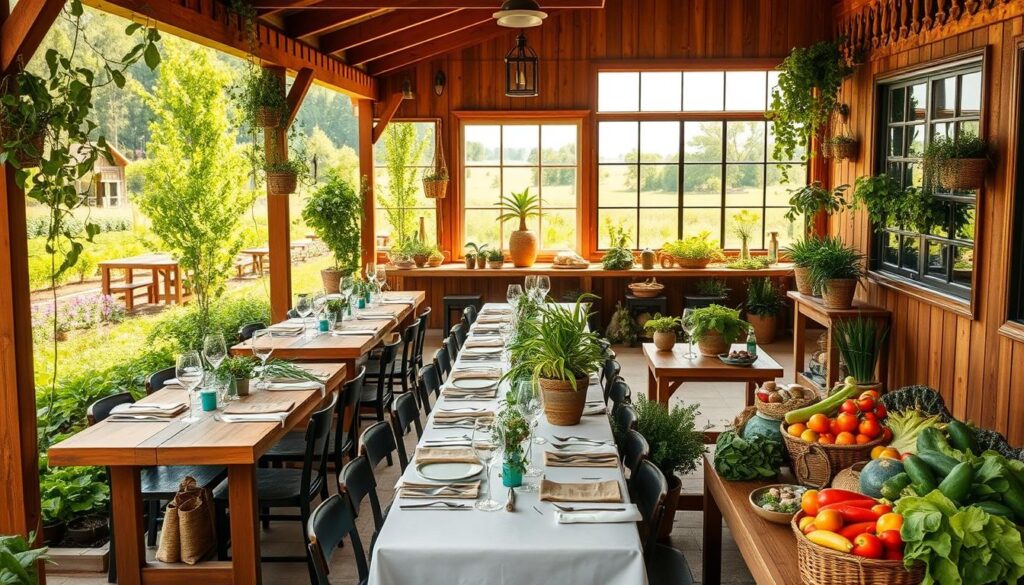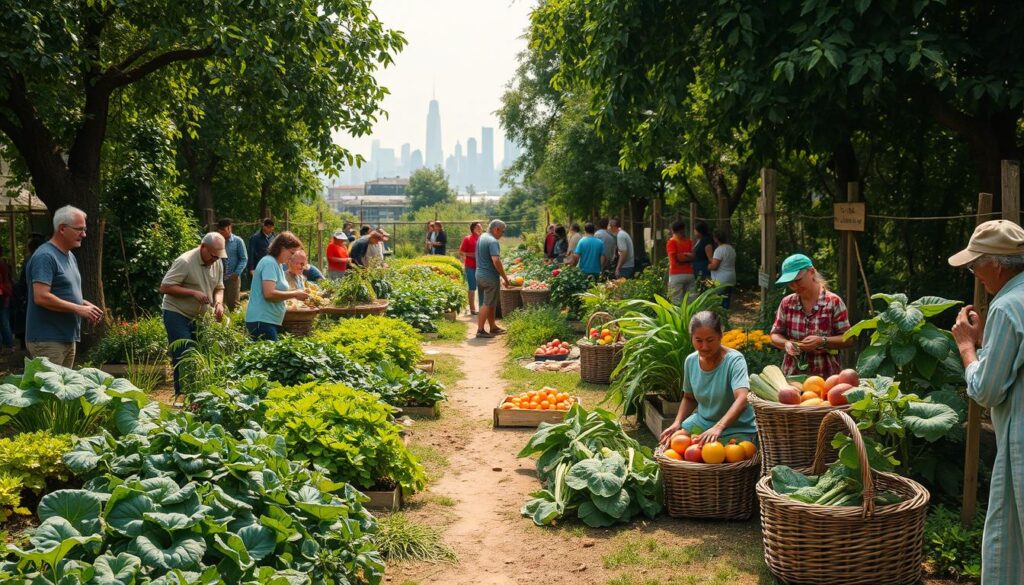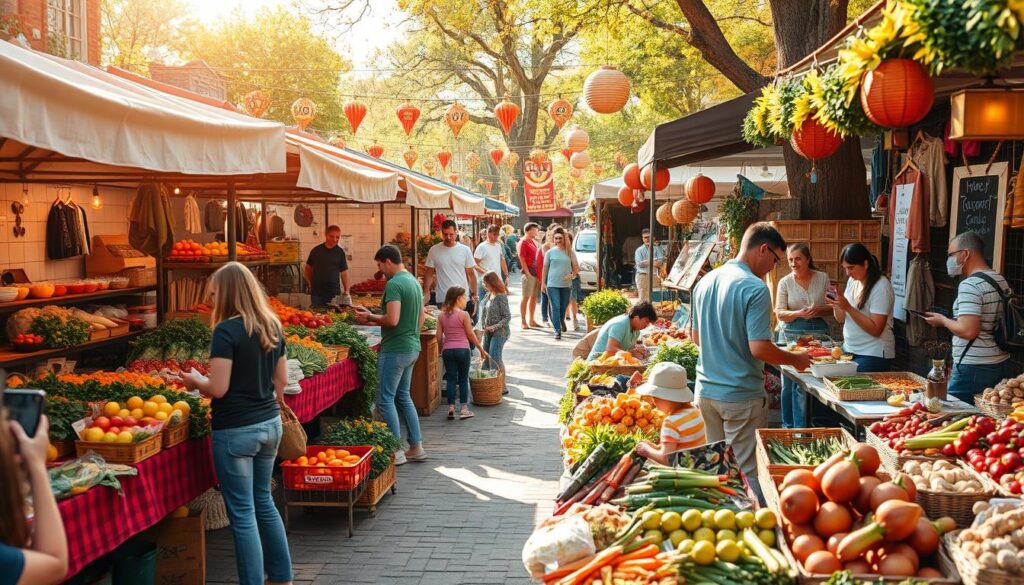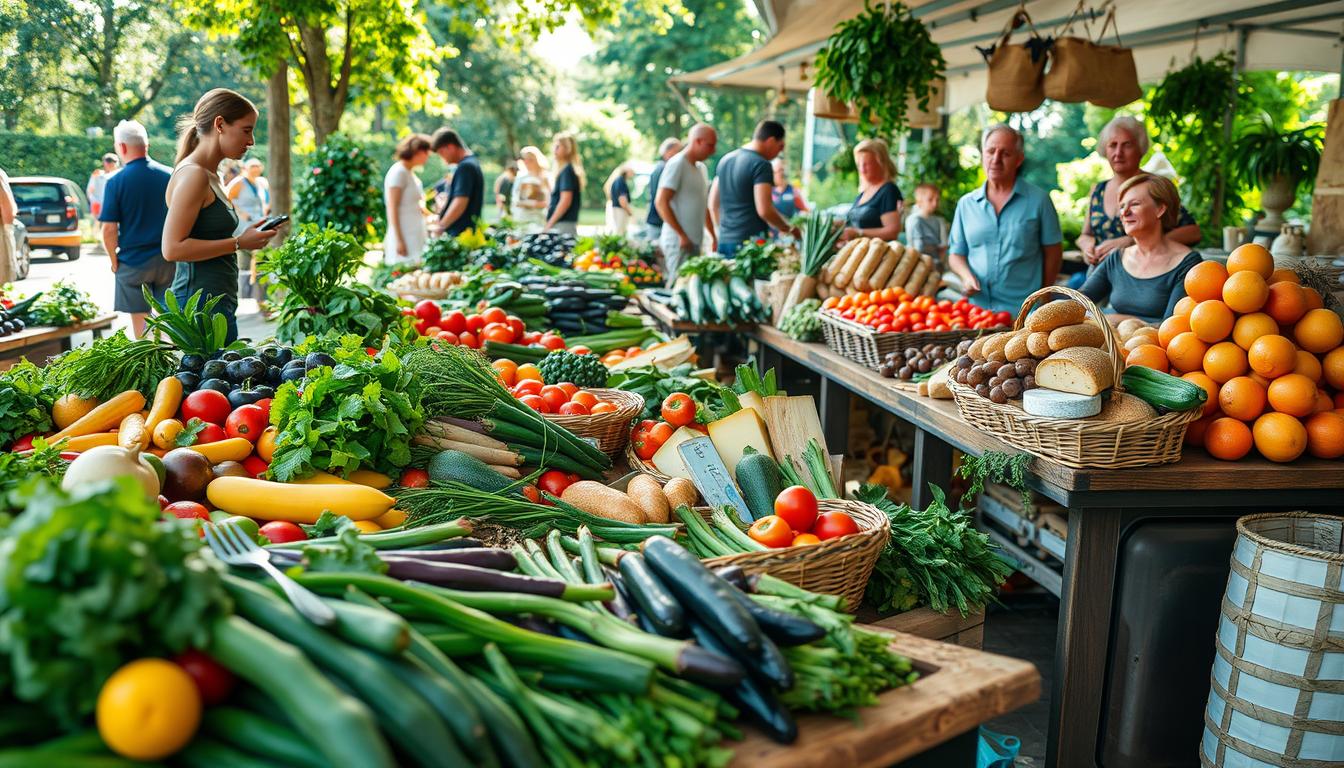Imagine enjoying a meal with fresh, local ingredients. You’ll know you’re helping the local economy and supporting sustainable food. As a traveler, you can make a difference by choosing organic and local food. Farm-to-table dining and CSA programs make it simple to enjoy sustainable meals.
There are many ways to enjoy organic and local food in your city. You can visit farmers’ markets or eat at farm-to-table restaurants. By choosing sustainable food, you’re pleasing your taste buds and helping the environment. You’re also supporting local farmers.
Key Takeaways
- Organic farming reduces exposure to harmful chemicals and promotes sustainable food practices
- Local food consumption helps reduce carbon emissions and supports the local economy
- Community-supported agriculture (CSA) programs provide regular access to fresh, organic food
- Farmers markets offer a diverse selection of local produce, artisanal goods, and restaurants
- Supporting local and organic food systems enhances community resilience and promotes sustainable tourism
- Using apps like Eat Well Guide, LocalHarvest, and HappyCow can help you find local and organic food options on your trips
- Many local farmers utilize sustainable growing techniques, even if they are not certified organic
Introduction to Organic and Local Food Experiences
Many people choose organic food for its health benefits and environmental impact. The USDA says organic food is grown without harmful chemicals. This makes it a better choice for those looking to eat healthier.
The demand for organic and local food has grown. More people want to buy from community-supported agriculture (CSA) programs. These programs help farmers and support the local economy by selling fresh, locally grown produce.
- Fresh, seasonal produce that is rich in nutrients and flavor
- Supporting the local economy and promoting sustainable agriculture practices
- Reducing the carbon footprint associated with transportation and packaging
Choosing organic and local ingredients helps the environment and our health. It also supports our local community.
Exploring Local Farmers’ Markets
Local farmers’ markets are a special place to shop. They offer fresh, organic produce and handmade goods. By shopping here, you help the local economy and support green farming.
Top Farmers’ Markets to Visit
- Houston Farmers Market
- Union Square Greenmarket
- Pike Place Market
What to Expect at These Markets
At these markets, you’ll find lots of products. There’s organic food, handmade items, and unique foods. You can also find local meats, dairy, and baked goods. Here’s a look at what’s available:
| Market | Products |
|---|---|
| Houston Farmers Market | Organic produce, artisanal goods, local meats |
| Union Square Greenmarket | Local dairy products, baked goods, specialty foods |
| Pike Place Market | Fresh seafood, organic produce, artisanal goods |
Farm-to-Table Restaurants
Farm-to-table restaurants offer the best of local cuisine. They focus on sustainable food practices. They get their ingredients from local farmers, making the food fresh and high quality.
Top farm-to-table spots include SingleThread, Blackberry Farm, and Coelette. They all highlight the value of locally sourced ingredients. For instance, SingleThread has a 24-acre farm for growing seasonal crops and flowers. Blackberry Farm has three restaurants that serve food from local sources.
When picking a farm-to-table restaurant, think about these points:
- Look for places with their own farms or gardens. Harvest at Castle Hot Springs has a five-course menu with daily garden ingredients.
- Check if the restaurant buys from local, family-run farms. 12 Farms Restaurant in Central New Jersey is a good example.
- Look at the menu. It should have seasonal and sustainable dishes using locally sourced ingredients.

Organic Food Tours
Going on organic food tours is a great way to see the local food scene. You learn about sustainable food practices too. These tours show how important local, organic, and ethically sourced ingredients are in cooking.
By taking eco-friendly food tours, you help local communities. You also get to enjoy the best of regional cuisine.
Tuscany and Bangkok are top spots for organic food tours. Tuscany has a long history of farm-to-table meals. Bangkok’s street food tours use ingredients from local vendors.
In the U.S., Portland and San Francisco are known for their sustainable food practices. They offer eco-friendly food tours that highlight local and organic food.
To book an organic food tour, look for local tour operators. They focus on sustainable food practices and eco-friendly food tours. These tours take you to farms, artisanal food shops, and restaurants with organic food.
Choosing an organic food tour helps local communities. You get to enjoy the best of regional cuisine. Plus, you support sustainable food practices.
Community Supported Agriculture (CSA)
CSA programs are a fantastic way to help local farmers and get fresh, organic food at your door. By joining, you buy shares of a farm’s produce regularly. This supports local farming and sustainable food practices.
Being part of a CSA has many advantages. You get fresh, locally sourced ingredients and organic produce. You also help the local economy and support farming that’s good for the planet. The USDA says CSA programs help consumers buy shares of a farm’s produce. This supports local agriculture and promotes sustainable food.
Some key benefits of CSA programs include:
- Supporting local farmers and the local economy
- Receiving fresh, organic produce and locally sourced ingredients
- Promoting sustainable farming practices and reducing carbon footprint
- Building a sense of community with other CSA members

Joining a CSA program helps your community and the environment. You also get to enjoy fresh, organic produce and locally sourced ingredients.
| CSA Program Benefits | Description |
|---|---|
| Supports Local Farmers | CSA programs provide financial support to local farmers, promoting sustainable agriculture and the local economy. |
| Fresh Organic Produce | CSA members receive fresh, organic produce and locally sourced ingredients, promoting healthy eating habits. |
| Promotes Sustainable Practices | CSA programs promote sustainable farming practices, reducing carbon footprint and promoting environmental sustainability. |
Organic Wine and Beer Tastings
Discover the local food scene by trying organic wine and beer tastings. Lancaster County has many vineyards, wineries, and tasting rooms. They help the local agritourism industry grow.
Some top places for organic drinks include:
- Tonnino Winery, specializing in USDA Certified Organic wines
- Cullari Vineyards, offering bestselling wines like White on White and Spectacullari
- Mount Hope Estate & Winery, providing traditional wine tastings and mixed tastings of beers and ciders
These spots offer a special tasting experience. They also support sustainable food practices. This helps reduce waste and environmental harm from long-distance transport.
More people want organic drinks, which is good for the planet. Local craft beers and wines cut down on transport waste. Many places now use refillable containers and recyclable packaging. This makes it simpler for us to choose eco-friendly options.
| Wineries and Breweries | Organic Selections |
|---|---|
| Tonnino Winery | USDA Certified Organic wines |
| Cullari Vineyards | White on White, Spectacullari |
| Mount Hope Estate & Winery | Traditional wine tastings, mixed tastings of beers and ciders |
Seasonal Food Festivals
As the seasons change, cities buzz with food festivals. These events highlight organic produce and local ingredients. They’re a fantastic way to dive into the local food scene and back small businesses.
Upcoming Festivals in the City
The city is gearing up for festivals like the Sugar Land Food Festival. It showcases organic and local ingredients. Other events, such as the City Market at Daley Plaza and the Green City Market, offer artisanal goods and fresh produce.
- City Market at Daley Plaza: every Thursday from May through October
- Green City Market: Saturdays and Wednesdays from May through October
- Sugar Land Food Festival: featuring organic produce and locally sourced ingredients

What Makes These Festivals Special
These festivals unite the community, supporting local farmers and artisans. They’re a chance to try new foods and drinks. Plus, you’ll learn about organic produce and local ingredients.
By going to these festivals, you support small businesses and sustainable farming. Whether you love food or just want a fun experience, these festivals are perfect. They let you explore new flavors and ingredients in the city.
Cooking Classes Featuring Local Ingredients
Cooking classes are a great way to learn about local ingredients and sustainable food. You can discover unique flavors and techniques from different cuisines. This includes farm-to-table dishes and full holiday meals.
Top cooking schools offer various classes, like hands-on and demonstration classes. For example, a school with 1,200 square feet and 4 workstations for hands-on classes provides a deep learning experience. Experienced chefs, like Chef Tim, who has 15 years of experience, guide you through learning about local ingredients and sustainable food.
Here are some benefits of cooking classes featuring local ingredients:
* Learn about seasonal and locally sourced ingredients
* Discover new recipes and cooking techniques
* Understand sustainable food practices and their importance
* Enjoy hands-on experiences and interactive learning
* Meet new people and make friends who share similar interests
Cooking classes are for everyone, including children, teens, families, and colleagues. Classes can be tailored and held at different places, like in-home or chef’s place. With many cuisine options, like Latin, Mediterranean, and Asian-Pacific, you can find classes that match your interests and skill level.
| Cooking School | Class Type | Price |
|---|---|---|
| Cooking School 1 | Hands-on | $59 |
| Cooking School 2 | Demonstration | $100 |
Eco-Friendly Food Packaging
More people are now thinking about the environment when they buy food. A study found that almost 60% of shoppers want to change their habits to help the planet. This change is pushing for more sustainable food choices, like using local ingredients and eco-friendly packaging.
Green Chef is a leader in using green packaging. They use materials that can break down easily and are safe for recycling. By working with local farmers, they also help the local economy. Eco-friendly food packaging is becoming essential for a greener food system.
Using eco-friendly packaging has many benefits. It cuts down on waste and lowers carbon emissions. Plus, it makes customers happier and more loyal. Over 70% of shoppers are even willing to pay more for it.
Companies can start by looking at their packaging and finding ways to improve. They might switch to materials that are better for the planet or reduce how much packaging they use. Making these changes can help the environment and make their brand more appealing to those who care about the planet.
Health Benefits of Organic Eating
Choosing organic food can greatly improve our health and wellbeing. Organic produce and locally sourced ingredients help us avoid harmful chemicals. The USDA says organic food is more nutritious and has fewer chemicals than non-organic.
Some key health benefits of organic eating include:
- Lower risk of pesticide exposure
- Higher intake of essential nutrients
- Reduced risk of antibiotic resistance
- Lower risk of hormone disruption
Organic eating also benefits the environment. Supporting local farmers and using local ingredients cuts down on carbon emissions. It promotes sustainable farming. So, choosing organic is good for us and the planet.
| Benefits of Organic Eating | Description |
|---|---|
| Higher Nutritional Value | Organic produce has higher nutritional value and lower pesticide residue than non-organic produce. |
| Lower Risk of Pesticide Exposure | Organic eating reduces our exposure to harmful pesticides and herbicides. |
| Positive Impact on the Environment | Supporting local farmers and choosing locally sourced ingredients reduces our carbon footprint and promotes sustainable agriculture. |
Local Food and Community Impact
Local food greatly benefits the community. It supports the economy and helps build a sustainable community through food festivals and events. When we choose local food, we help the local economy. All money spent stays in the community, helping it grow.
Choosing local food also helps keep farmland and green spaces. It makes our environment more sustainable. Local food systems are safer because they have fewer steps in distribution. This reduces the risk of contamination and makes food safer.
Local growers can share how they grow and harvest food. This builds a clear and honest relationship between consumers and producers.
Some of the benefits of local food include:
- Supporting the local economy
- Promoting environmental sustainability
- Enhancing food safety
- Fostering transparent relationships between consumers and producers
By choosing sustainable food practices like local food, we positively impact our community. As demand for local food grows, it’s crucial to see its value. Local food is key to building a sustainable community.
Resources for Continuing Your Organic Food Journey
As you keep exploring organic food, having good resources is key. With more people wanting organic food resources, finding what you need is easier. You can find cookbooks, online forums, and more to stay informed and meet others who share your interests.
The USDA’s National Organic Program is a great place to start. It offers lots of info on sustainable food practices and how to know if food is organic. Also, local groups host workshops, cooking classes, and farm tours. These events show the value of using locally sourced ingredients.
Here are some top picks for resources:
- Books: “The Omnivore’s Dilemma” by Michael Pollan, “Animal, Vegetable, Miracle” by Barbara Kingsolver
- Online Resources: USDA National Organic Program, Local Harvest
- Local Organizations: Community Supported Agriculture (CSA) programs, farmers’ markets
Using these resources will help you embrace organic food resources, sustainable food practices, and locally sourced ingredients in your everyday life.
| Resource | Description |
|---|---|
| USDA National Organic Program | Provides information on organic certification standards and sustainable food practices |
| Local Harvest | Offers a directory of local farmers’ markets, CSAs, and farm stands |
Conclusion: Embrace Organic and Local Food Experiences
Exploring organic and local food is a great way to help our planet and our health. You can find vibrant farmers’ markets and farm-to-table restaurants in [Your City]. These places let you connect with the local food scene.
Choosing organic and local foods is good for you and the earth. Organic farming can even help fight climate change by storing more carbon. This is because it uses methods that are better for the environment.
Supporting local food also helps the economy. It makes our food system stronger and more sustainable. As more people choose organic and local, we move closer to a healthier food future.
Next time you’re cooking or looking for a new food adventure, think about organic and local options. You might enjoy a farm tour, a cooking class, or a food festival. These experiences are good for you and your community. Start your organic food journey today and join the movement for better food.







